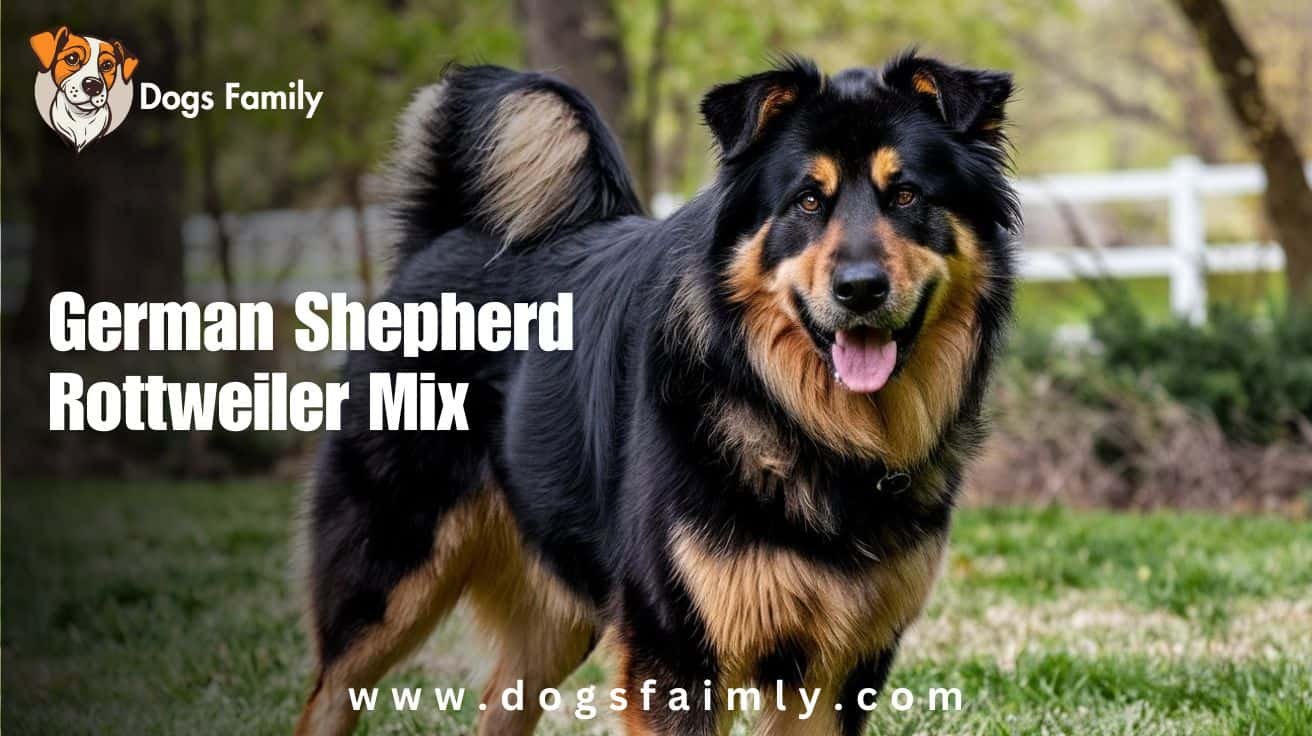The German Shepherd Rottweiler Mix: A Comprehensive Guide
If you’re considering adding a new furry friend to your family, you may have come across the German Shepherd Rottweiler mix, also known as a Shepweiler. This hybrid breed is gaining popularity for its intelligence, loyalty, and strong protective instincts. In this article, we will explore the characteristics, care needs, and overall temperament of this unique mix to help you decide if it’s the right fit for you.
Understanding the Parent Breeds
Before diving into the specifics of the German Shepherd Rottweiler mix, let’s take a closer look at its parent breeds.
German Shepherd
The German Shepherd is one of the most popular dog breeds in the world. Known for their intelligence and versatility, they are often used in various roles, including police, military, and service dogs. German Shepherds are loyal, and protective, and make excellent family pets. Their strong work ethic and eagerness to please make them highly trainable.
Rottweiler
The Rottweiler is another intelligent breed known for its strength and confidence. Originally bred to drive cattle, Rottweilers are now often used as guard dogs and in search-and-rescue operations. They are loyal and protective of their families, making them excellent companions. However, they require proper training and socialization to ensure they are well-adjusted.
Characteristics of the German Shepherd Rottweiler Mix
A German Shepherd Rottweiler mix combines the best traits of both parent breeds. Here are some key characteristics you can expect:
Appearance
The appearance of a Shepweiler can vary, but they typically have a strong, muscular build. They usually inherit the German Shepherd’s wolf-like face and the Rottweiler’s broad head. Their coat can be medium to long, often with a mix of black, tan, and brown colors.
Temperament
In terms of temperament, this mix is known for being loyal, protective, and intelligent. They are likely to bond closely with their families and can be cautious around strangers. With proper training and socialization, they can be friendly and well-adjusted pets. However, their protective instincts may make them wary of unfamiliar people.
Energy Levels
Both German Shepherds and Rottweilers are active breeds, so expect your Shepweiler to have high energy levels. Daily exercise is essential to keep them happy and healthy. Activities like walking, running, and playing fetch can help burn off excess energy.
Care and Training
Caring for a German Shepherd Rottweiler mix requires commitment and effort. Here are some essential tips for training and care:
1. Training
Training should begin early, as both parents breeds benefit from socialization and obedience training. Here’s a step-by-step guide to effective training:
- Start Early: Begin training as soon as you bring your puppy home. Early socialization helps them become well-rounded adults.
- Use Positive Reinforcement: Reward-based training is highly effective for this mix. Use treats, praise, and play to encourage good behavior.
- Be Consistent: Consistency is key. Establish rules and stick to them to avoid confusion.
- Seek Professional Help: If you’re unsure how to train your Shepweiler, consider enrolling in a dog training class or hiring a professional trainer.
2. Exercise
As mentioned earlier, this mix requires plenty of exercise. Aim for at least an hour of physical activity each day. Here are some fun ways to keep your dog active:
- Daily Walks: Regular walks are essential for mental and physical stimulation.
- Playtime: Engage in interactive games like fetch or tug-of-war.
- Agility Training: Consider agility courses to challenge their minds and bodies.
3. Grooming
The grooming needs of a German Shepherd Rottweiler mix can vary based on their coat type. Generally, regular brushing will help minimize shedding and keep their coat healthy. Bathing should be done as needed, usually every few months, unless they get particularly dirty.
4. Health Considerations
Mixed breeds can inherit health issues from either parent breed. Common health concerns for Shepwilers include hip dysplasia, elbow dysplasia, and certain heart conditions. Regular vet check-ups and a balanced diet can help mitigate these risks.
Anecdote: A Day in the Life of Max
Let me share a story about Max, a friendly German Shepherd Rottweiler mix. Max lives with his owner, Sarah, in a suburban neighborhood. Each morning, Sarah takes Max for a brisk walk, allowing him to explore the scents of their neighborhood.
After their walk, they return home for training sessions, where Sarah uses treats to teach Max new commands. In the afternoons, Max enjoys playing fetch in the backyard, and he loves chasing after his favorite squeaky toy.
One day, a stranger approached their yard. Max barked and stood protectively in front of Sarah, showcasing his natural guarding instincts. However, thanks to his training and socialization, he was soon calm and welcoming when Sarah introduced the visitor.
Sarah often shares how rewarding it is to have a loyal companion like Max, who not only keeps her safe but also brings joy and energy to her life.
Is a German Shepherd Rottweiler Mix Right for You?
While the German Shepherd Rottweiler mix has many wonderful qualities, it’s essential to assess whether it fits your lifestyle. Consider the following:
- Time Commitment: Are you ready to invest time in training and exercising your dog?
- Living Environment: Do you have enough space for an active dog? A house with a yard is ideal.
- Experience Level: Have you owned dogs before? This mix may not be the best fit for first-time dog owners due to its training needs.
Conclusion: Embrace the Shepweiler!
The German Shepherd Rottweiler mix is a fantastic companion for the right owner. With their intelligence, loyalty, and protective nature, they can be both loving family pets and excellent guardians. If you decide to welcome a Shepweiler into your home, be prepared for a rewarding journey filled with love, training, and plenty of adventures.
Consider reaching out to local shelters or breeders to find a German Shepherd Rottweiler mix that needs a loving home. By providing proper care, training, and socialization, you can ensure a happy and fulfilling life for your new furry friend.
Hyperlinks:
What is a Rottweiler and German Shepherd mix called?
A mix between a Rottweiler and a German Shepherd is commonly called a Shepweiler. This hybrid breed inherits traits from both parent breeds, making them intelligent, loyal, and protective companions. Shepwilers typically exhibit a strong and muscular build, combining the physical characteristics of both breeds. They are known for their high energy levels, requiring regular exercise and mental stimulation. With proper training and socialization, Shepwilers can be friendly and well-adjusted pets, making them suitable for families. However, potential owners should be prepared for their strong protective instincts and commitment to training.
Are shepweilers good dogs?
Shepweilers (German Shepherd Rottweiler mixes) can be excellent dogs for the right owners. They inherit the intelligence and loyalty of both parent breeds, making them protective and devoted companions. With proper training and socialization, Shepweilers can be friendly, well-adjusted pets. They thrive in active environments, requiring regular exercise and mental stimulation. However, their strong protective instincts mean they may be cautious around strangers. It’s essential for potential owners to commit to training and socializing them early. Overall, Shepweilers can be loving family members and effective guardians with the right care and attention.
How big do Rottie Shepherds get?
What are the health issues with German Shepherd Rottweiler mix?
The German Shepherd Rottweiler mix, like many mixed breeds, can inherit health issues from both parent breeds. Common health concerns include hip dysplasia, where the hip joint doesn't fit properly into the hip socket, leading to arthritis and pain. Elbow dysplasia is another issue affecting joint health. This mix may also be prone to heart problems, such as dilated cardiomyopathy, and certain stomach issues, including bloat, which can be life-threatening. Regular veterinary check-ups, a balanced diet, and proper exercise can help mitigate these risks and ensure a healthier life for your Shepweiler.

